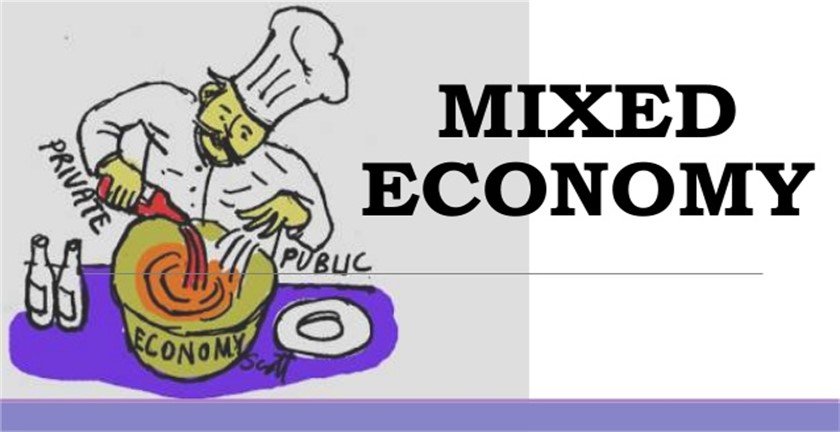Image source: slideshare.net
A mixed economy combines affairs of private enterprise with those of public enterprise. It comprises features of free market and command economy.
Governments in developed countries use the mixed economy to safeguard people and the market. The government exercises a significant influence over the country’s economy by forming fiscal and monetary regulation policies.
A mixed economy looks at the employment standards, environmental protection, welfare systems, and publicly owned enterprises. Let’s look at the pros and cons of mixed economy.
Pros:
1. Job creation: The growth of mixed economy creates more job opportunities for the public. Innovative private companies create competitive employment opportunities and the government is able to hire more employees in the public sector.
2. Provide opportunities for businesses to thrive: A mixed economy encourages businesses to innovate and thrive in the competitive market. Consumers will benefit from a wider choice of products and pricing options.
3. Protection of the society: A mixed economy allows the fair participation of private sector in production activities and ensures the society is fully protected from the swings of the market.
4. Minimize government influence: A mixed economy focuses on the equal distribution of control by balancing the needs of the private enterprise with those need of the government sector. The government exercises a certain amount of control on the running of the private enterprise.
5. Clearly defines the role of government: A mixed economy clearly defines the role of government in defining policies and regulation of the market to improve the economic stability of the country as a whole.
6. Freedom: It allows the private sector to determine how to run the business in terms of what to produce, the pricing strategies to use and who to employ among other factors.
7. More efficient private firms: Since most of the business is left for private firms, the firms are more efficient compared to those controlled by the government. This makes them have a profit incentive for being innovative and cut on costs.
8. Provision of capital: Businesses which are efficient and innovative in a mixed economy receive capital due to their efforts. The consumers will be able to purchase products which have personal value and in return, a business can invest more capital to gain high profits.
9. Equal level of control within the economy: In a mixed economy, both businesses and government are in full control of the economy. This ensures there is an equal distribution of control on the economy of the country.
10. Safety net from poverty: A mixed economy creates equality and a safety net to prevent people from failure and entering into poverty. People will be able to receive financial rewards for their hard work in entrepreneurship business.
Cons:
1. Excessive intervention from the government: A mixed economy may receive a lot of interventions from the government due to political influences in the country.
2. Government going too far: Sometimes the government may not exercise a fair balance in the control of private enterprises. The set government policies may result in a poorly managed economy and wrong involvement.
3. Limited corporate size: Rules in regard to anti-trust laws and monopolies may lead government set policies that limit company size. The companies may also be heavily taxed to support other economic aspects.
4. High taxes: Excessive government intervention requires a lot of investment and this leads to increased taxes. High tax payments may demotivate employees at the workplace.
5. Fear of nationalization: Combination of private and public sector elements may give the government the ability to own and nationalize any industry. This leaves the private industry with the fear that the government might nationalize their industry.
6. Less use of resources: A mixed economy focuses on the interest of the society and this may hinder maximum utilization of resources. The government will focus on creating products and services which are beneficial to society instead of the betterment of the economy.
7. Difficult to find a balance: The biggest challenge in a mixed economy is to find a balance between market freedom and wealth equality. This may result in economic inequality and lack of social mobility.
8. Encourage debt: Government managed industries may be subsidized into monopolies and this leads to high levels of debts. As the debts accumulate, the government may transfer budget resources from other programs to cover the debts and this creates more debts.
9. Trigger poverty and wealth: Government powers on control of the economy can trigger wealth, it can also trigger poverty if government interference and control is on large scale.
10. Creates special influences: Government intervention in the economy creates a potential for special interests. The government will make decisions based on the influence of a few people instead of a benefit to all.



